Podcast Appearances
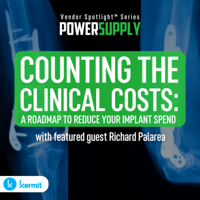
Counting the Clinical Costs: A Roadmap to Reduce Your Implant Spend
Rich Palarea goes on the Power Supply podcast to give the roadmap for hospitals and health systems to reduce their implant spend. Rich dives into how their hospital partners can boast of a 20-30% cost reduction from previous implant spends, as Kermit takes full ownership of the implant RFP process, working together with internal supply chain resources to obtain fair market costs for implants used. Hospital supply chain needs a dedicated resource who not only knows the products being procured but has intimate knowledge of the contracting strategies of these manufacturers. And they need purpose-built technology that can automate the paper-based process and accurately manage costs.
LISTEN: Apple Podcasts | Spotify | Amazon Podcasts | Google Podcasts | Transcript
.jpg?width=200&height=200&name=41N8CpGARnL._SL500_%20(2).jpg)
Visionary Values: How Entrepreneurs Drive Industry Change
Rich Palarea joins Hays Waldrop, Garry Skinner and Justin Poulin to give us his perspective on why he has enjoyed his career launching new businesses and what has made healthcare unique relative to other industries. Tune in for a great story and gain some key insights into what it takes to be successful bringing new solutions forward to solve old problems in new and different ways!
LISTEN: Apple Podcasts | Spotify | Amazon Podcasts | Google Podcasts | Transcript

Operating with Transparency: For Your Health
Rich Palarea’s introduction on Twitter reads: “I won’t sleep until I fix $ waste in healthcare.” Cal listens to the story of how Rich became CEO of Kermit, a company that uses technological transparency to reduce costs on surgical implants for hospitals. The conversation reveals how little we know about what goes on behind the scenes in some operating rooms. It also gives us hope that applying transparency across all aspects of healthcare will make life better for everyone.
LISTEN: Apple Podcasts | Spotify | Google Podcasts | Stitcher | Transcript

Rich Palarea on How Hospitals Can Save Millions
Rich Palarea CEO of Kermit, a Baltimore-based healthcare cost reduction and spend management company that brings automation and insight to the high-spend category of implantable medical devices within hospitals and health systems. Chris and Rich discuss the current problems with the model and bring solutions to the table to make a more transparent and fair priced solution.
LISTEN: Apple Podcasts | Spotify | Amazon Podcasts | Website | Transcript

The Doctor Whisperer - the BUSINESS of medicine
Richard Palarea is the CEO of Kermit, a Baltimore-based healthcare cost reduction and spend management company bringing automation and insight to the high-spend category of implantable medical devices within hospitals and health systems.
Since its founding in 2011, Kermit has saved hospitals more than $200 million and manages 40% of the implantable device spend transacting in Maryland.
LISTEN AND WATCH: Apple Podcasts | Spotify | YouTube | Transcript

Surgical Cost Reduction and Spend Management w/Kermit CEO Richard Palarea
Richard Palarea is the CEO of Kermit, a Baltimore-based healthcare cost reduction and spend management company bringing automation and insight to the high spend category of implantable medical devices within hospitals and health systems. Since it’s founding in 2011, Kermit has saved hospitals more than 200 million dollars and manages 40% of the implantable device spend transacting in Maryland.
Kermit has been recognized in multiple years as an Inc. 5000 company and by the Baltimore Business Journal as a Fast 50 company and a TOP Software Company ranked by local revenue, as well as SmartCEO's Future 50.
Kermit is the recipient of industry awards, including the Federation of American Hospitals' Heartbeat of Healthcare for its work as an innovative partner helping hospitals manage costs during a global pandemic.
LISTEN: Spotify | Transcript
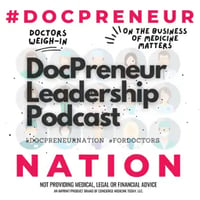
Meet Kermit. Impartial, evidence-based financial control to PPI spend.
Today our guest is Richard D. Palarea, CEO & Co-founder of Kermit.
Kermit is an analytics platform that delivers insight to the fragmented spend category of physician preference items. Kermit equips supply chain managers, surgeons and executives with real-time data on implantable medical device transactions, offering unprecedented visibility that’s saving hospitals millions of dollars.
LISTEN: Apple Podcasts | Spotify | Transcript

Creating Efficiencies in the Implantable Medical Device Space
One implication of the current pandemic is that many elective surgeries were delayed or postponed amidst global uncertainty. As the healthcare ecosystem continues to adjust to these uncertainties and evolve, it's important to examine existing and emerging technologies that are helping to create efficiencies within the industry.
Today’s episode focuses on demystifying the implantable medical device journey for healthcare systems and practitioners as well as discussing the future of connected devices in the space.
LISTEN: Apple Podcasts | Spotify | Google Podcasts | Transcript

Making Things Easy: Increasing Profits, Creating Culture, And Giving Back
Richard Palarea is the CEO of Kermit, a Baltimore-based healthcare cost reduction and spend management company bringing automation and insight to the high-spend category of implantable medical devices within hospitals and health systems. Since its founding in 2011, Kermit has saved hospitals more than $200 million and manages 40% of the implantable device spend transacting in Maryland. Kermit has been recognized in multiple years as an Inc. 5000 company and by the Baltimore Business Journal as a Fast 50 company and a Top Software Company ranked by local revenue, as well as SmartCEO’s Future 50. Kermit is the recipient of industry awards, including the Federation of American Hospitals’ Heartbeat of Healthcare for its work as an innovative partner helping hospitals manage costs during a global pandemic.
LISTEN AND WATCH: Apple Podcasts | Spotify | Google Podcasts | YouTube | Transcript
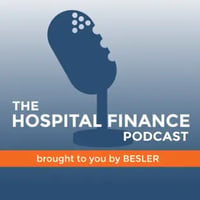
Transforming the Antiquated Paper-Based Process of Surgical Billing
In this episode, we are joined by Richard Palarea, CEO of Kermit, to talk with us about the advantages and challenges associated with delivering visibility into implantable medical device transactions.
LISTEN: Apple Podcasts | Spotify | Transcript

Impact of Operating Room Shut Downs Due to Staffing Shortages
A recent article in the Boston Globe raised a red alert on hospital operating rooms being temporarily closed due to staffing shortages and other pandemic related challenges. In the article, Dr. Eric Dickson, CEO of UMass Memorial Health, reported that, “… closing ORs is a near daily event.” He stated that UMass Memorial has nearly 2,000 staff vacancies, including 500 openings for nurses, making it hard to keep the ORs functioning at normal capacity. In the article, Mass General Brigham, Beth Israel Lahey, and Lowell General all reported similar challenges in keeping their operating rooms open.
Our special guest on this episode is Richard Palarea, CEO of Kermit PPI, a Baltimore-based healthcare cost reduction and spend management company focused on maximizing operating room efficiencies and profitability. Rich is an expert in hospital OR operations and has seen the good and bad side of healthcare systems from a business and management perspective.
LISTEN: Apple Podcasts | Spotify | Google Podcasts | Transcript

Transforming the Antiquated Process of Surgical Billing and Savings Millions in the Process for Hospitals and Health Systems
Did you know how hospitals bill their patients for surgeries? Wondering what all those itemized pieces on your bill are when you receive your statement of work? Surgeons, nurses, and medical device sales professionals move like a ballet in the operating room, so how do we change the antiquated paper-billing process of a long surgery for the hospital and patient without disrupting that flow?
Introducing Richard Palarea, CEO of Kermit, a Baltimore-based healthcare cost reduction and spend management company bringing automation and insight to the high-spend category of implantable medical devices within hospitals and health systems. Since its founding in 2011, Kermit has saved hospitals more than $200 million and manages 40% of the implantable device spend transacting in Maryland. He's discovered the million-dollar idea that many have failed to cultivate until now, and he's implemented it in multiple hospitals to save them an enormous amount of money. Listen to today's episode to discover how he transformed the billing process with his software and saved health institutions millions of dollars along the way.
LISTEN: Apple Podcasts | Spotify | Google Podcasts | Transcript
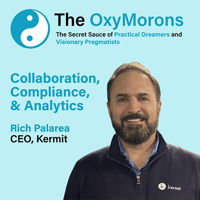
The OxyMorons - S3E2 - Rich Palarea, CEO Kermit
Today’s guest on The OxyMorons is Rich Palarea, CEO and co-founder of Kermit. Kermit is an analytics platform that delivers insight to the fragmented spend category of physician preference items (PPI). Kermit equips supply chain managers, surgeons, and executives with real-time data on implantable medical device transactions, offering unprecedented visibility that’s saving hospitals millions of dollars.
In both of our deep pasts, Rich and I both worked at AIIM. Any errors in transcription or curation that follow are mine. I do consider myself a personal expert on medical devices since I had a hip replacement in 2013. However, I have no idea what my hip cost, which I guess is the focus of The OxyMoron idea at the heart of Rich’s company.
WATCH: YouTube | Website | Transcript

The Freedom Formula for Physicians - How to Save on Billing with Rich Palarea of Kermit
And our guest today, Richard Palarea is the CEO of Kermit, a Baltimore-based healthcare cost reduction and spend management company bringing automation and insight to the high-spend category of implantable medical devices within hospitals and health systems.
LISTEN: Apple Podcast | Spotify | Website | Transcript

HealthBiz Podcast: Interview with Kermit CEO Richard Palarea
Kermit CEO Rich Palarea share his company's approach to enabling hospitals and health systems to keep the cost of implantable medical devices under control.
Host David E. Williams is president of healthcare strategy consulting firm Health Business Group.
LISTEN AND WATCH: Apple Podcast | Spotify | Amazon Podcast | YouTube | Stitcher | Google Podcast | Transcript

Off-White Coat: Surgeons, Surgical Reps, and Can Kermit be the Balance Between Them ft. Richard Palarea
Richard Palarea is the CEO of Kermit, a cost reduction and spend management company focused on implantable medical devices. Kermit uses analytics to provide surgeons and hospital systems with the true money spent while implanting surgical devices. Since its founding in 2011, Kermit has saved hospital systems $200 million dollars. Join us while we pick Rich's brain and learn more about the true costs of healthcare.
LISTEN AND WATCH: Apple Podcast | Spotify | Amazon Podcast | Stitcher | Google Podcast | Transcript

Break Everything...In Healthcare: Healthcare Cost Reduction and Spend Management
Kermit is a Baltimore-based healthcare cost reduction and spend management company bringing automation and insight to the high-spend category of implantable medical devices within hospitals and health systems. Since its foundation in 2011, Kermit has saved hospitals more than $200 million and manages 40% of the implantable device spend transacting in Maryland. Kermit has been recognized in multiple years as an Inc. 5000 company and by the Baltimore Business Journal as a Fast 50 company and a Top Software Company ranked by local revenue, as well as SmartCEO’s Future 50. Kermit is the recipient of industry awards, including the Federation of American Hospitals’ Heartbeat of Healthcare for its work as an innovative partner helping hospitals manage costs during a global pandemic.
LISTEN AND WATCH: Apple Podcast | Spotify | YouTube | Transcript
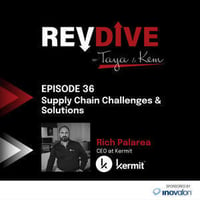
RevDive: Supply Chain Challenges & Solutions with Richard Palarea, CEO at Kermit
Welcome back to RevDive! Join as Richard Palarea, CEO at Kermit joins RevDive to discuss challenges & solutions in supply chain management.
What you'll get out of this episode:
His background & the background of Kermit
The trending supply chain challenges including high margins, staffing shortages, and more
What work flow optimization is looking like in the supply change industry
What to do to prioritize supply chain management
LISTEN AND WATCH: Apple Podcast | Spotify | YouTube | Google Podcast | Transcript
Book Kermit on Your Podcast
888-568-4248
Kermit Support
CaseSnap Support
11350 McCormick Road,
Executive Plaza 3, Suite 500
Hunt Valley, Maryland 21031
Join our team!
View our open positions.

